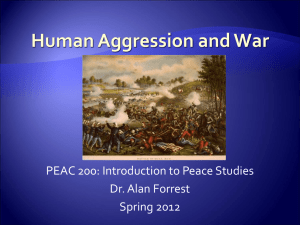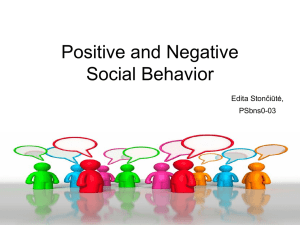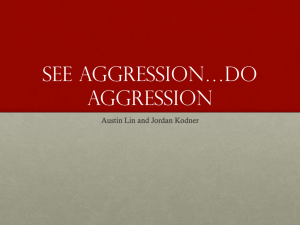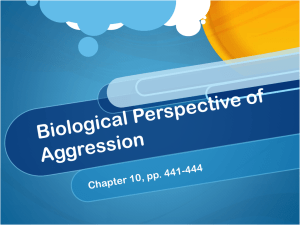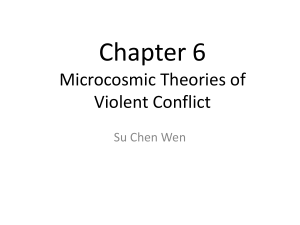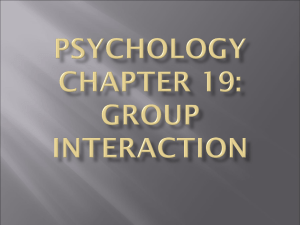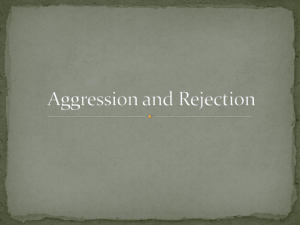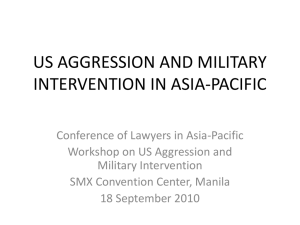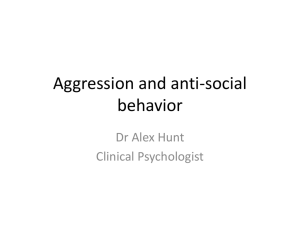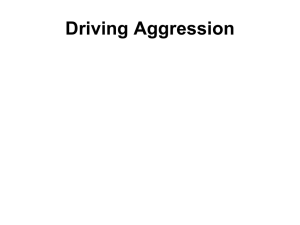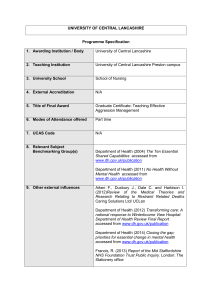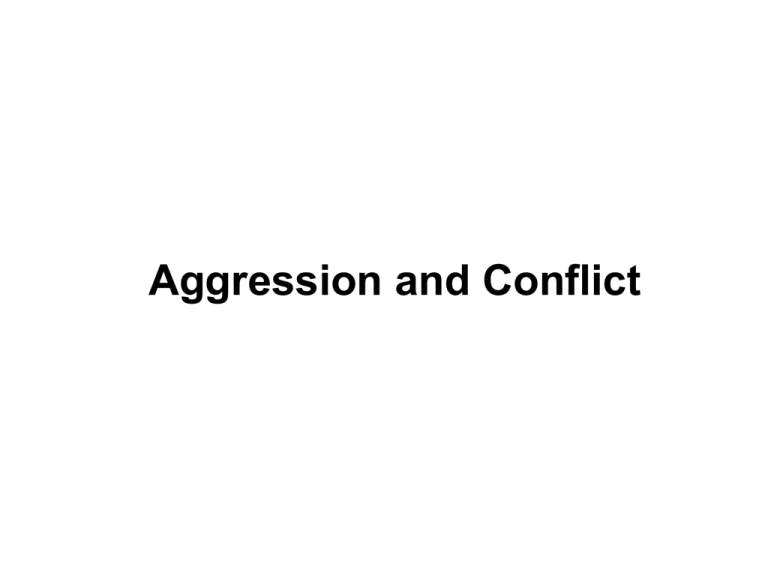
Aggression and Conflict
I. What is Aggression?
A. Aggression: physical or verbal behavior that is most often
intended to cause harm.
B. Instrumental Aggression: aggressive behavior used as a
means of achieving a goal.
C. Hostile Aggression: aggressive behavior fueled by anger
and directly intended to hurt another person as an end in itself.
D. Relational Aggression: aggressive behavior aimed at
damaging or interfering with another person’s relationships,
reputation, or psychological well-being.
II. What Are Some Key Theories and
Causes of Aggression?
A. Biological Bases
B. The Frustration-Aggression Theory: the idea that
frustration caused by a failure to obtain a desired or expected
goal leads to aggressive behavior.
1) Displaced Aggression: the transference of aggression
to a target other than the source of the frustration.
Generally, the new target is a safer or more socially
acceptable target.
2) Triggered Displaced Aggression: the more similar a
potential target of displaced aggression is to the source of
the frustration, the greater the likelihood of displacement
upon that target.
Initial Experimenter
Insult
YES
NO
YES
LONG TIME
IN COLD
WATER
SHORT TIME
IN COLD
WATER
SHORT TIME
IN COLD
WATER
SHORT TIME
IN COLD
WATER
Secondary
Other “Pseudo”
Participant Insult
NO
Revised Frustration-Aggression Theory
C. Social Learning Theory: we learn social behavior by
observing and imitating others and by being rewarded and
punished.
1) Bandura’s “Bobo” Doll Studies
2) Family Influence
3) Cultural Influence
4) The Rewards of Aggression
D. Relative Deprivation: the perception that one is less well
off than others with whom one compares oneself.
E. Pain
Zap for Zap!
F. Heat
Baseball… Hitting the Hitter!
G. Odor
Cigarette Smoke and Flatulence!
H. Alcohol
I. Arousal
1) Arousal magnifies whatever emotion you may be experiencing.
J. Aggression Cues
K. Violence Among Intimate Partners
L. Pornography and Sexual Violence
M. Television and Aggression
1) Six out often TV shows portray violence.
2) It’s usually glamorized, trivialized, or glorified.
Televised violence affects our thinking through…
1) Desensitization
2) Social Scripts
3) Altered Perceptions
4) Cognitive Priming
N. Video Games and Aggression
1) Virtual violence (video games) may have a stronger
effect than passive media (television).
2) Virtual violence increases aggressive thoughts,
feelings, and behaviors, and decreases prosocial
(helping) behavior.
O. A History of Violence
III. Reducing Aggression
A. Catharsis: emotional release. The notion that aggressive
drives are reduced when one “releases” aggressive energy,
either by acting aggressively or by fantasizing about aggressive
activity.
B. Sublimation: this refers to the transformation of sexual or
aggressive energies into acceptable and prosocial behaviors.
C. Operant Conditioning: learning based on association of
behavior with its consequences. The individual learns from the
consequences of “operating” in the environment.
1) Positive Reinforcement: increases desired behavior by rewarding
that behavior.
2) Negative Punishment: decreases undesired behavior by removing
something pleasant.
D. Forms of Discipline
What doesn’t work well...
1) Power Assertion: disciplinary strategy designed to discourage
undesirable behavior through physical or verbal enforcement of parental
control.
What does work well...
2) Inductive Techniques: disciplinary techniques designed to induce
desirable behavior by appealing to a child’s sense of reason and fairness.
IV. Conflict
I. Behavior Traps: Situations in which conflicting
parties, by each rationally pursuing its self-interest,
become caught in mutually destructive behaviors.
A. The Prisoner’s Dilemma:
a situation in which a
person must choose
between a cooperative
act and an act very
beneficial only to
himself or herself
and most likely hurtful
to others.
B. The Commons Dilemma: people who share a common
resource tend to overuse it and therefore make it unavailable
in the long run.
II. Getting Out of Behavior Traps
A. Regulation
B. Make the Group Small
C. Communication
D. Change the Payoffs
E. Reciprocal Altruism: helping others with the understanding
that they are supposed to eventually help us.
F. Avoid Moochers
V. Key Remedies for Conflict
A. Superordinate Goal: a shared goal that necessitates
cooperative effort; a goal that overrides people’s differences.
B. Friendships
C. Equal-Status
D. Reconciliation

